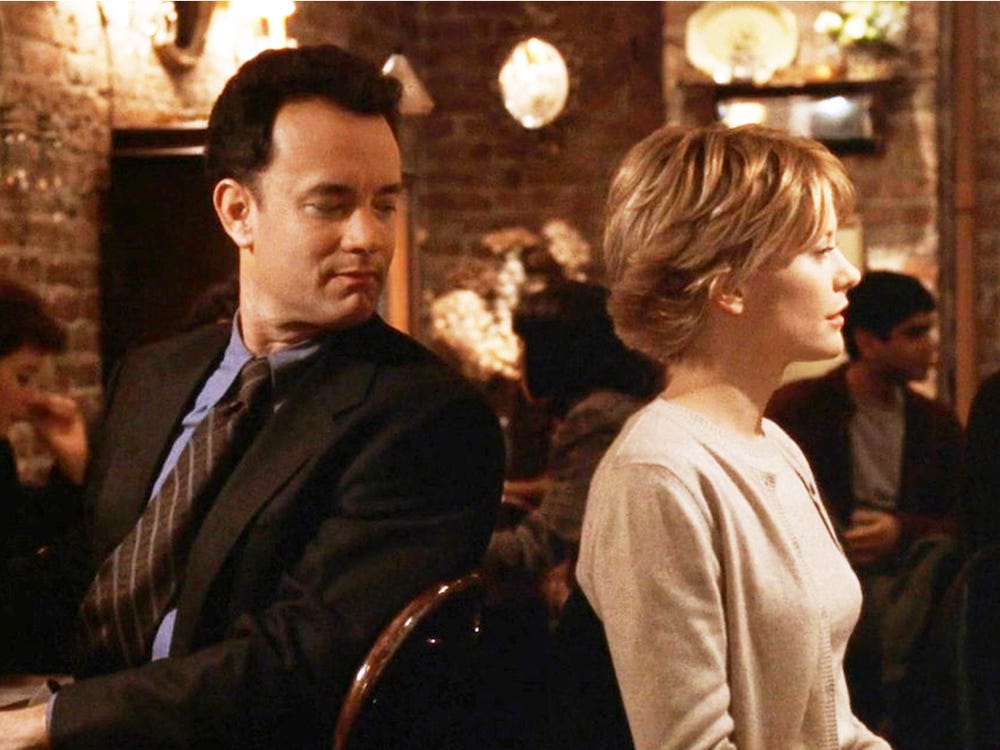
A few nights ago I was rewatching “You’ve Got Mail” and a line jumped out at me in a way it hadn’t in previous viewings. Meg Ryan’s character (Kathleen Kelly) complains to Tom Hanks’ character (Joe Fox), “‘Joe, just call me Joe.’ As if you were one of those stupid twenty-two year old girls with no last name. ‘Hi, I’m Kimberly.’ ‘Hi, I’m Janice.’ Don’t they know you’re supposed to have a last name?” This got me thinking. This movie came out almost 25 years ago in 1998 and now in 2022 I can’t recall a single time someone has introduced themselves to me using their last name. I certainly have never used my last name while making an introduction. Is it time for that to change?
Our society has consistently become less formal and less focused on traditional etiquette. So much of our social interaction and introductions takes place online where our last name is usually listed on our profile or email sign off. We now go to less cocktail hours, dinner parties, and community events than our parents’ and grandparents’ times and that sad trend has been expedited due to the pandemic. Our opportunities for these types of introductions come fewer and far between.
Introductions have changed drastically over the last 30-50 years. Let’s take a look at what Emily Post and Amy Vanderbilt had to say about introductions. In Emily Post’s 1950 edition of “Etiquette” she states, “A man should say, ‘Are you Miss Manners? I am Arthur Jones. I met you at a dinner at Mrs. Worldly’s last winter.’ Where upon Muriel would greet him with the inevitable “How do you do, Mr. Jones’ – or if she is willing to be called Muriel, she says, ‘Hello Arthur.” As you can see this form of introduction is made even more formal with the use of Mr and Miss which has fallen out of fashion amongst younger generations. In Amy Vanderbilt’s 1956 edition of “Amy Vanderbilt’s Everyday Etiquette,” Amy explains “The words of the introduction between a man and woman go this way: “‘Mrs. Gardiner, Mr. Longstreth.’ Or, ‘Mr. Longstreth, I would like you to meet Mrs. Gardiner.’ Or, again, and more formally, ‘Mrs. Gardiner, may I present Mr. Longstreth.” To say that there has been a drastic change in the way we make introductions would be an understatement.
While it no longer seems necessary to use titles in introductions (unless you are introducing yourself to someone of great superiority “Mr. President”, someone much older, or you are in a work environment where this is the norm), I do wonder if introducing with our last name is the more practical thing to do. Let me share my reasonings.
Number One: Context
Introducing with your last name can help the recipient immediately categorize who you are. Maybe you have met on Instagram, email, or the person has heard your name used by others. My name is extremely common, so introducing myself by saying “Hello, my name is Emily,” does not help the recipient compute who I am. If I say “Hello, my name is Emily Vallely,” they might now place who I am and have a frame of reference for continuing the conversation. Offering your last name seems like the polite thing to do, especially in a work environment where your name might already be known by others even though you have never met. How embarrassing would it be to be introduced to the CEO of your company whom you have never met and have a conversation without having the context of who they are? Providing your last name could prevent tons of potential awkwardness.
Number Two: Familial Connection
Sharing your last name immediately connects you to your family. In some situations maybe we’d rather not, depending on our relationship with family members. But in many situations we have family members who we are proud to be connected to. This also goes hand in hand with my first point, context, your last name might help you be placed through family relations. Maybe this person is a friend of your father’s or if you are a woman who has taken their partner’s last name it places your name with your partner. This point might apply more to people who live in more tight nit communities or communities where family ties are strong and important. In Los Angeles this issue doesn’t come up so often for me, but in Des Moines, IA where my parent’s and my fiancé’s extended family live, saying that I’m a part of the Pertzborn family has a more distinct meaning because the Pertzborn family consists of upward of 100 members within the state of Iowa.
Number Three: Memorization
As I previously stated, my name is very common. As much as I love my name, I share it with so many other women and girls. Providing my last name could potentially help others memorize my name easier, especially since I have a much less common last name “Vallely” and soon to be “Pertzborn.” Having these last names helps set me apart from all the other Emilys, just as other Emily’s last names sets them apart from mine. I know I have an easier time remembering a name when it is slightly longer and/or unique or interesting sounding. Even if your last name is quite common, the added syllables could help form a stronger memory attachment.
For most of us, our names play a huge role in our identity. So it only makes sense that in introductions we share in its fuller form. I happen to believe it sounds better and slightly more formal (there’s nothing wrong with bringing a touch of formality to some aspects of our life), but beyond that I think there is a practical side as well. I’m so curious, what are your thoughts on this subject? Let me know so I can discuss this topic further on my upcoming podcast “Etiquette With Emily.”
-Emily Vallely
